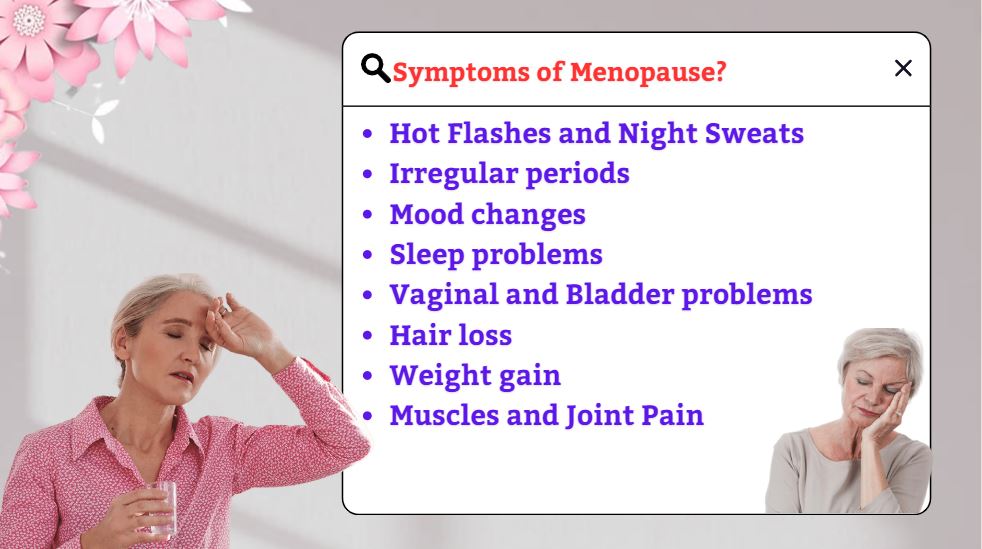Menopause Symptoms

Immediate effect of Menopause:
Vasomotor, Psychological, Sexual & Urogenital Symptoms
1. Vasomotor symptoms: Hot flushes, night sweats palpitations & headache are the most distressing symptoms of menopause. These are more severe after surgical menopause. These are attributed to Pitta & Vata doshas.
2. Psycological symptoms: Many females are affected with anxiety, depression, decrease in libido & dementia. Ayurveda hypothesis their occur to the imbalance of Vata.
3. Urogenital symptoms: Urinary incontinence (stress& urge) vaginal dryness & prolapsed of uterus are very important. Ayurveda described Shushka yoni (dry vagina with atrophy of urogenital tract) & Maha yoni (uterovaginal prolapse).
Long term effect of Menopause:
Skeletal system & cardiovascular system
1. Skeletal System: Osteoporosis occur rapidly after menopause in women. It is responsible for the greater incidence of fracture of spine, proximal femur, distal radius. According to Ayurveda osteoporosis can be explained on the basis of excess Vata formation in Pakvashaya & AasthiDhatu.
2. Cardiovascular Disease: During and after the menopause, a woman’s body gradually produces less oestrogen than it used to. This increases the risk of the coronary arteries narrowing whereas it previously protected the lining of the artery walls reducing the build-up of plaque. This increases your risk of developing coronary heart disease, or a circulatory condition such as stroke. According to Ayurveda decline of Ojas (AshtaBindu- Para Ojas) & Avalambak Kapha due to excess of Vata is the cause of cardiovascular disease.
Hot Flashes and Night Sweats:
Hot flashes are sudden feelings of heat that spread mainly through the face, neck, and chest. Your skin might redden, as if you're blushing. A hot flash can also cause sweating. If you lose too much body heat, you might feel chilled afterward. Night sweats are hot flashes that happen at night, and they may disrupt your sleep.
Irregular periods:
Ovaries begin producing less hormones, as ovulation becomes more unpredictable, the length of time between periods may be longer or shorter, menstrual bleeding flow may be light to heavy, and you may skip some periods.
Mood changes and Sleep problems:
Lower estrogen levels may lead to irritability, fatigue, anxiety, sleep problems, and other factors that can affect mood. Hormonal changes may also affect levels of serotonin and norepinephrine, which may have links with depression.
Vaginal and Bladder problems:
When estrogen levels diminish, your vaginal tissues may lose lubrication and elasticity, making intercourse painful. Low estrogen may also leave you more vulnerable to urinary or vaginal infections. Loss of tissue tone may contribute to urinary incontinence.
Hair loss:
During menopause, start growing hair where you didn’t before. Or, the hair you have start to thin. One cause may be changing levels of hormones during menopause. Estrogen and progesterone levels fall, meaning that the effects of the androgens, male hormones, are increased. During and after menopause, hair might become finer (thinner) because hair follicles shrink. Hair grows more slowly and falls out more easily in these cases.
Weight gain:
The hormonal changes of menopause might make you more likely to gain weight around your abdomen than around your hips and thighs. The weight gain is usually related to aging, as well as lifestyle and genetic factors.
Muscles and Joint Pain:
One reason menopause impacts the joints is these changing hormone levels. There are estrogen receptors in your joints; estrogen protects bones and helps keep joint inflammation low. As estrogen levels decline during perimenopause (the first stage of menopause), the joints can swell and become painful. Another contributing factor is osteoporosis. Decreasing estrogen levels also contribute to loss of bone density. This puts menopausal women at higher risk for osteoporosis, a condition in which reduced bone mass makes the bones weak and brittle.
- Hot Flashes and Night Sweats
- Irregular periods
- Mood changes and Sleep problems
- Vaginal and Bladder problems
- Hair loss
- Weight gain
- Muscles and Joint Pain
- Loss of interest in sex
Services
Specialists


